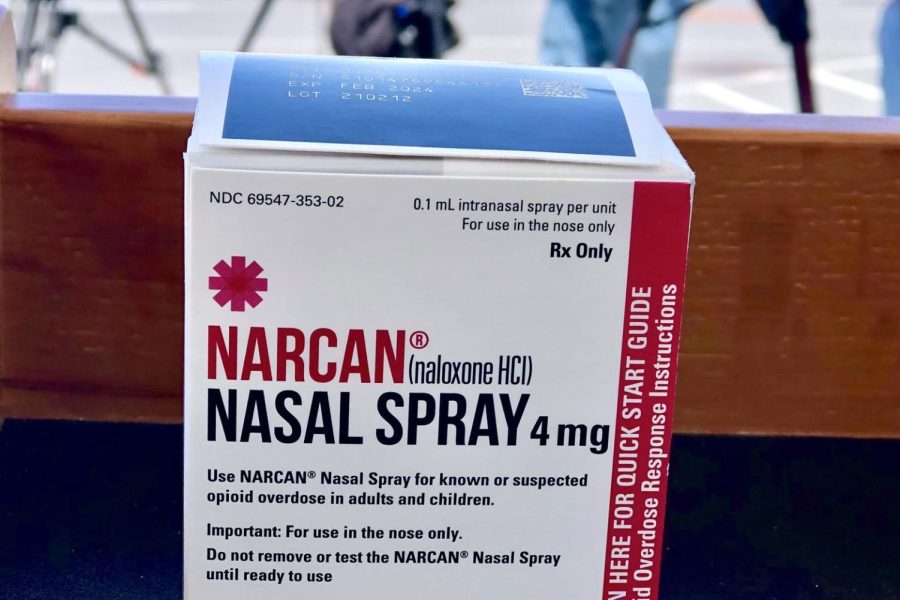MCPS implements a new policy after major drug issues
Narcan, a life-saving medication that can quickly reverse the effects of opioid overdoses, is now permitted for students to carry in school with the hope that the number of fatal overdoses in MCPS decrease.
May 30, 2023
Within the walls of MCPS, an insidious force has seized control: the fentanyl epidemic. From narratives of misguided experimentation to the victims of peer pressure, fentanyl-induced overdoses have plagued the county. Now, to combat the growing number of overdoses, MCPS has implemented a new policy in which students can carry personally obtained Naloxone, commonly known by its brand name Narcan, in schools and during school-sponsored activities without fear of disciplinary action.
Narcan, commonly administered as a nasal spray, is a life-saving medication that swiftly reverses the harmful effects of an opioid overdose, preventing potential fatality. As Narcan works fast and effectively, it is crucial to have it on hand, whether that be with a school nurse, other staff member or student.
“It’s important that Narcan is available because recently there have been more and more overdoses,” WCHS junior Leah Ginsburg said. “People can overdose super quick and action needs to be taken immediately in those situations. Allowing students to carry Narcan without punishment, and just having it in schools in general, is essential.”
With the implementation of the new policy, students are not only permitted, but also encouraged to carry Narcan in case of a life-threatening situation. However, this raises important questions: will students actually administer Narcan if the time comes? And how much responsibility should be placed on students to save lives as opposed to school nurses and medical personnel?
“I think some students may choose to carry Narcan while others may not,” Ginsburg said. “I know a lot of students may not know how to administer Narcan or even know what Narcan is, so it’s unrealistic to expect every student to carry it. However, when it comes to students having a responsibility to save someone’s life, it’s important that they step up. Nurses and main office staff often don’t know what’s going in bathrooms and hallways, and won’t be able to see things that students see, so students should look out for each other and be prepared to administer Narcan if needed.”
The implementation of this new policy partly stems from the approximately 60 opiate overdoses occurring each month across MCPS. Following those overdoses, Narcan has been administered 15 times in MCPS schools throughout the 2022-23 school year. As the number of overdoses has dramatically increased during this school year, many students realize the seriousness of this issue and the importance of Narcan.
“The abundance of overdoses in our county is really unfortunate,” WCHS junior Kaeylyn Morandi said. “Narcan has done a lot in saving students’ lives, and we need to continue to educate ourselves and our peers about what to do in a life-threatening event. Although it may not seem likely, you could be the one to save someone’s life.”
Despite Narcan being necessary to save lives, some suspect that its availability may perpetuate the use of opioids. This belief comes from the fact that if individuals were to overdose, they would simply be able to rely on Narcan to revive themselves and prevent a fatal outcome. Consequently, this creates a perceived “safety net” that enables people to continue abusing opioids without the fear of consequences.
“I’m sure there are people who continue to abuse lethal drugs because they know Narcan can save their lives in an overdose situation,” Morandi said. “However, I don’t think that’s a safe mentality anyone should follow. Narcan should be treated as something that is only used for emergencies, not something that magically cures an overdose just for a person to go back to using opioids. Thinking that way is really dangerous and can lead to more deaths.”
Since the new policy requires students to personally obtain Narcan, its effectiveness may be compromised. Many students may not know where to get Narcan, or how to administer it, leading to a lack of awareness and perceived necessity among students. And while many agree that the current policy is a step in the right direction, students hope for broader availability of Narcan in the future to address this issue.
“I think a step further would be for the county to supply students with Narcan and have areas in the school where it’s available, such as in bathrooms or near the main office,” Ginsburg said. “The policy is definitely beneficial, but going forward I think if MCPS were to have Narcan available throughout schools for student use we would see an even greater decrease in overdoses.”



